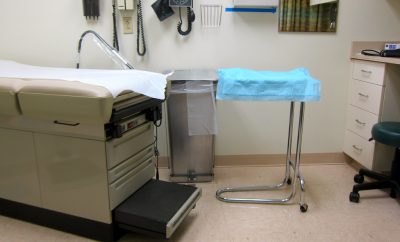
Crime
First Pregnant Woman Arrested Under Controversial Tennessee Law
Mallory Loyola became the first pregnant woman to be arrested and charged with assault on her fetus under Tennessee’s new controversial law criminalizing the illegal use of drugs during pregnancy. Loyola was arrested July 8, 2014, one week after the law went into effect. The 26-year-old tested positive for methamphetamine (not technically a narcotic) before being released on bail. If convicted Loyola could be incarcerated for up to a year.
According to the new law, “a woman may be prosecuted for assault for the illegal use of a narcotic drug while pregnant, if her child is born addicted to or harmed by the narcotic drug.” If a woman does not enroll in a treatment program for the narcotic, she would be charged. According to RH Reality Check, a reproductive health news group, “the law was promoted by prosecutors against the recommendations of medical professionals.” Governor Bill Haslam says that the legislation is intended to encourage women to go to treatment centers; however, the effect of the bill may be different from its intended purpose.
Outcomes of Criminalizing Pregnancy
Imani Gandy of RH Reality Check suggests that Black women will be targeted by the law’s enforcement at a disproportionate rate. Based on ugly stereotypes with roots in Reagan-era “crack baby” rhetoric, more scrutiny would be placed on pregnant Black women, Gandy says. Whether or not these prejudices are acted on, there is a structural problem for disadvantaged, minority women.
State Senator Mike Bell explained that in his rural district “there’s no treatment facility for these women there, and it would be a substantial drive for a woman caught in one of these situations to go to an approved treatment facility. Looking at the map of the state, there are several areas where this is going to be a problem.” Healthy and Free Tennessee notes that the state has 177 addiction treatment facilities; yet only two “provide prenatal care on site and allow older children to stay with their mothers, and only 19 provide any addiction care for pregnant women.” For impoverished women, accessing and enrolling in treatment centers will be extremely difficult, if not impossible.
There is a discrepancy between the intention of the bill, as suggested by Haslam, and the likely effect of the bill. While it may have been passed to incentivize enrollment in treatment programs, it will likely result in the incarceration of women who cannot access those treatment centers. Because Tennessee did not expand Medicaid under the Affordable Care Act, the costs of such treatment may be overwhelming. Women who know that they cannot access addiction services will be discouraged from seeking help, lest they be charged with assault and have their children taken away.
Other Approaches
In response to prenatal substance abuse, Tennessee passed the Safe Harbor Act about a year ago. The 2013 legislation, also signed by Haslam, was designed to ensure that women can access treatment centers without fear of incarceration or having their children removed. The more recent bill not only negates the benefits of the Safe Harbor Act, but regresses Tennessee even further.
This heavy-handed approach to prenatal substance abuse hints at another discrepancy: addiction is viewed by some as a disease, and by others as a crime. While the state and the governor embrace the latter with the passage and enforcement of this law, the federal government has taken a different approach.
Michael Botticelli, acting director of the White House Office of National Drug Control Policy, spoke about the federal government’s broad strategy in response to the recent Tennessee law: “Under the Obama administration, we’ve really tried to reframe drug policy not as a crime but as a public health-related issue, and that our response on the national level is that we not criminalize addiction.” The politics of considering substance abuse a criminal offense rather than a disease is amplified by the politics of federal-state relationships.
Support for the Law
The Tennessee Medical Association was supportive of the Safe Harbor Act, yet its president, Dr. Doug Springer, recently spoke out in favor of the new law. “The misdemeanor means it can be expunged by a judge, it means that the [Department of Human Services] doesn’t take your baby away. It has nothing to do with an application for a job because it doesn’t interfere with your job prospects, and that’s really important,” says Dr. Springer. Obviously, if a mother is incarcerated, she and her baby could not be together. But if the law makes it easy for the offense to be expunged, incarcerated mothers may not have to go through as many obstacles as other ex-convicts.
Because the law is so new, Mallory Loyola’s outcome will set precedent. The law is set to expire after two years, at which time Tennessee will evaluate its effects.
—
Jake Ephros (@JakeEphros)
Featured image courtesy of [Greyerbaby via Pixabay]








Comments